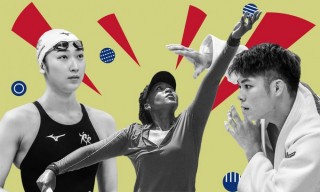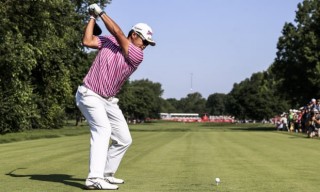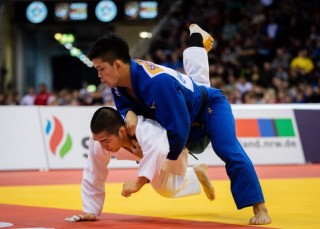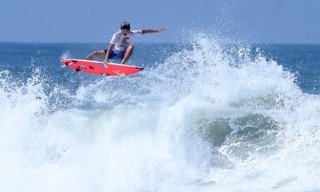Loading
Search
▼ From Osaka to Matsuyama: Japan’s best hopes of Olympic glory in Tokyo
- Category:Other
Fans will not be filling the arenas but the host nation still expects a taste of glory on Japanese soil after their Rio bonanza
The decision to ban spectators from attending all but a handful of Tokyo 2020 events amid a surge of Covid-19 cases in the host city has stripped Japanese athletes of the psychological advantage of performing in front of home crowds.
It is no surprise, then, that Japan’s Olympic committee – like those in other countries – is focusing on athlete safety instead of formal medal targets, despite the country coming off its best-ever haul of 41 medals at Rio.
That said, Japan is quietly optimistic about the prospect of seeing its sportsmen and women earning enough medals to take it into the top four behind the US, China and athletes representing Russia.
Having quit the French Open and skipped Wimbledon citing her struggle with depression, Naomi Osaka has said that she “could not be more excited” to be competing in Tokyo this summer.
The absence of Serena Williams, whom the world No2 defeated to win the US Open in 2018, have raised the prospects that Osaka – born to a Japanese mother and Haitian father – will add Olympic gold to her four grand slam titles in the country of her birth.
Kei Nishikori, who was knocked out in the second round at Wimbledon, will set aside his disappointment – and nagging doubts about the pandemic-hit Games – in an attempt to improve on his bronze five years ago.
Hideki Matsuyama is among several competitors hoping to translate professional success into Olympic glory. The first Japanese player to win a golf major has buoyed embattled Tokyo 2020 organisers, speaking of his desire to “make my fellow Japanese citizens proud” when he tees off at Kasumigaseki Country Club. An Olympic honour to go with his Masters green jacket could even erase memories of having to play a round with Donald Trump a few years ago.
The decision to ban spectators from attending all but a handful of Tokyo 2020 events amid a surge of Covid-19 cases in the host city has stripped Japanese athletes of the psychological advantage of performing in front of home crowds.
It is no surprise, then, that Japan’s Olympic committee – like those in other countries – is focusing on athlete safety instead of formal medal targets, despite the country coming off its best-ever haul of 41 medals at Rio.
That said, Japan is quietly optimistic about the prospect of seeing its sportsmen and women earning enough medals to take it into the top four behind the US, China and athletes representing Russia.
Having quit the French Open and skipped Wimbledon citing her struggle with depression, Naomi Osaka has said that she “could not be more excited” to be competing in Tokyo this summer.
The absence of Serena Williams, whom the world No2 defeated to win the US Open in 2018, have raised the prospects that Osaka – born to a Japanese mother and Haitian father – will add Olympic gold to her four grand slam titles in the country of her birth.
Kei Nishikori, who was knocked out in the second round at Wimbledon, will set aside his disappointment – and nagging doubts about the pandemic-hit Games – in an attempt to improve on his bronze five years ago.
Hideki Matsuyama is among several competitors hoping to translate professional success into Olympic glory. The first Japanese player to win a golf major has buoyed embattled Tokyo 2020 organisers, speaking of his desire to “make my fellow Japanese citizens proud” when he tees off at Kasumigaseki Country Club. An Olympic honour to go with his Masters green jacket could even erase memories of having to play a round with Donald Trump a few years ago.
Failure to dominate the judo competition in the country of the sport’s birth would appal Japanese fans, who are now consigned to following the action at home. Japanese judoka won 16 medals, including five gold, at the 2019 world championships in Tokyo and should find similar form at the Nippon Budokan.
Shohei Ono will lead Japan’s charge against expected resistance from France. Ono is aiming for a second consecutive Olympic gold in the men’s 73 kg class, with his main rival likely to be Rio silver medalist Rustam Orujov of Azerbaijan.
Other promising home judoka include siblings Hifumi and Uta Abe. Double world champion Hifumi will compete in the men’s 66 kg class. Uta has won the last two world titles in the 52 kg class, having lost only once in the last three years.
Another Japanese martial art, karate, will be making its first appearance at the Olympics, reportedly after lobbying from the Japanese prime minister, Yoshihide Suga.
After preparations were disrupted by allegations of bullying and physical abuse that led to the resignation of the Japan Karatedo Federation’s technical director, Masao Kagawa, the home attack has regrouped under his replacement, the popular former karate champion Rika Usami.
Ryo Kiyuna is a favourite to win gold, while among the women Kiyou Shimizu is expected to reignite her fierce rivalry with Spanish world champion Sandra Sanchez.
Other sports making their Olympic debuts - surfing, skateboarding and sport climbing – could prove fertile ground for Japan’s athletes.
Shohei Ono will lead Japan’s charge against expected resistance from France. Ono is aiming for a second consecutive Olympic gold in the men’s 73 kg class, with his main rival likely to be Rio silver medalist Rustam Orujov of Azerbaijan.
Other promising home judoka include siblings Hifumi and Uta Abe. Double world champion Hifumi will compete in the men’s 66 kg class. Uta has won the last two world titles in the 52 kg class, having lost only once in the last three years.
Another Japanese martial art, karate, will be making its first appearance at the Olympics, reportedly after lobbying from the Japanese prime minister, Yoshihide Suga.
After preparations were disrupted by allegations of bullying and physical abuse that led to the resignation of the Japan Karatedo Federation’s technical director, Masao Kagawa, the home attack has regrouped under his replacement, the popular former karate champion Rika Usami.
Ryo Kiyuna is a favourite to win gold, while among the women Kiyou Shimizu is expected to reignite her fierce rivalry with Spanish world champion Sandra Sanchez.
Other sports making their Olympic debuts - surfing, skateboarding and sport climbing – could prove fertile ground for Japan’s athletes.
Kanoa Igarashi and other Japanese surfers will seek to exploit their knowledge of the Olympic venue in Chiba prefecture in readiness for the men’s and women’s shortboard competitions.
Kai Harada and Tomoa Narasaki should give the host country a shot at the men’s sport climbing event, which combines three disciplines – speed climbing, lead climbing and bouldering – along with Akiyo Noguchi and Miho Nonaka in the women’s event.
After Sky Brown, who has recovered from a terrifying fall last year, decided to represent Britain rather than Japan, local skateboarding medal hopes now rest on Sakura Yosozumi, Aori Nishimura and Misugu Okamoto, who will compete on the shores of Tokyo Bay.
Japan is in the unprecedented position of heading into the Games with a chance of challenging China’s dominance on the badminton court.
The world world No1, Kento Momota, could banish memories of missing Rio after gambling at an illegal casino in Japan – an ignominy that was followed by tragedy early last year when his driver died during an accident in Kuala Lumpur in which Momota suffered facial injuries.
Yuki Fukushima and Sayaka Hirota lead the rankings in the women’s doubles, followed by another Japanese pairing with China in third.
Daiya Seto will be among the Japanese swimmers vying for medals when he competes in the 200m butterfly and the 200m and 400m individual medleys. Kosuke Hagino, a double medalist in Rio, will line up against Seto in the 200m individual medley and swim in the 4x200m freestyle relay. Relay teammate Katsuhiro Matsumoto will also aiming for gold in the 200m freestyle.
Kai Harada and Tomoa Narasaki should give the host country a shot at the men’s sport climbing event, which combines three disciplines – speed climbing, lead climbing and bouldering – along with Akiyo Noguchi and Miho Nonaka in the women’s event.
After Sky Brown, who has recovered from a terrifying fall last year, decided to represent Britain rather than Japan, local skateboarding medal hopes now rest on Sakura Yosozumi, Aori Nishimura and Misugu Okamoto, who will compete on the shores of Tokyo Bay.
Japan is in the unprecedented position of heading into the Games with a chance of challenging China’s dominance on the badminton court.
The world world No1, Kento Momota, could banish memories of missing Rio after gambling at an illegal casino in Japan – an ignominy that was followed by tragedy early last year when his driver died during an accident in Kuala Lumpur in which Momota suffered facial injuries.
Yuki Fukushima and Sayaka Hirota lead the rankings in the women’s doubles, followed by another Japanese pairing with China in third.
Daiya Seto will be among the Japanese swimmers vying for medals when he competes in the 200m butterfly and the 200m and 400m individual medleys. Kosuke Hagino, a double medalist in Rio, will line up against Seto in the 200m individual medley and swim in the 4x200m freestyle relay. Relay teammate Katsuhiro Matsumoto will also aiming for gold in the 200m freestyle.
A medal for Rikako Ikee would eclipse any other Japanese achievement in the pool. Ikee, who will focus on the women’s 4x100m freestyle and medley relays, qualified for the Games after winning her battle with leukaemia.
Routinely referred to as the greatest male gymnast of all time, Kohei Uchimura is expected to take advantage of the chance to win what would almost be the seven-time Olympic medalist’s valedictory gold on home soil in the high bar in Tokyo, his fourth Olympics.
Players on Japan’s baseball team are each in line for a ¥10m ($90,000) cash bonus if they win their first Olympic gold at Fukushima Azuma stadium, one of few venues that could allow a limited number of spectators. But they will face competition from a South Korean team also bristling with professionals drafted in from its domestic league.
Covid-19 restrictions mean people in Sapporo could be denied the chance to see Toshikazu Yamanishi, Eiki Takahashi and Koki Ikeda take a clean sweep in the 20km racewalk.
Japanese wrestlers have been set the ambitious target of 10 medals, including five gold. Yuki Takahashi will compete in the men’s 57kg freestyle, while Sosuke Takatani will feature in his third straight Games in the 86kg freestyle.
Rio gold medalist Risako Kawai is expected to contend for medals in the 57kg freestyle, while her younger sister Yukako could make it a double family celebration in the 62kg.
Routinely referred to as the greatest male gymnast of all time, Kohei Uchimura is expected to take advantage of the chance to win what would almost be the seven-time Olympic medalist’s valedictory gold on home soil in the high bar in Tokyo, his fourth Olympics.
Players on Japan’s baseball team are each in line for a ¥10m ($90,000) cash bonus if they win their first Olympic gold at Fukushima Azuma stadium, one of few venues that could allow a limited number of spectators. But they will face competition from a South Korean team also bristling with professionals drafted in from its domestic league.
Covid-19 restrictions mean people in Sapporo could be denied the chance to see Toshikazu Yamanishi, Eiki Takahashi and Koki Ikeda take a clean sweep in the 20km racewalk.
Japanese wrestlers have been set the ambitious target of 10 medals, including five gold. Yuki Takahashi will compete in the men’s 57kg freestyle, while Sosuke Takatani will feature in his third straight Games in the 86kg freestyle.
Rio gold medalist Risako Kawai is expected to contend for medals in the 57kg freestyle, while her younger sister Yukako could make it a double family celebration in the 62kg.
- July 22, 2021
- Comment (0)
- Trackback(0)





